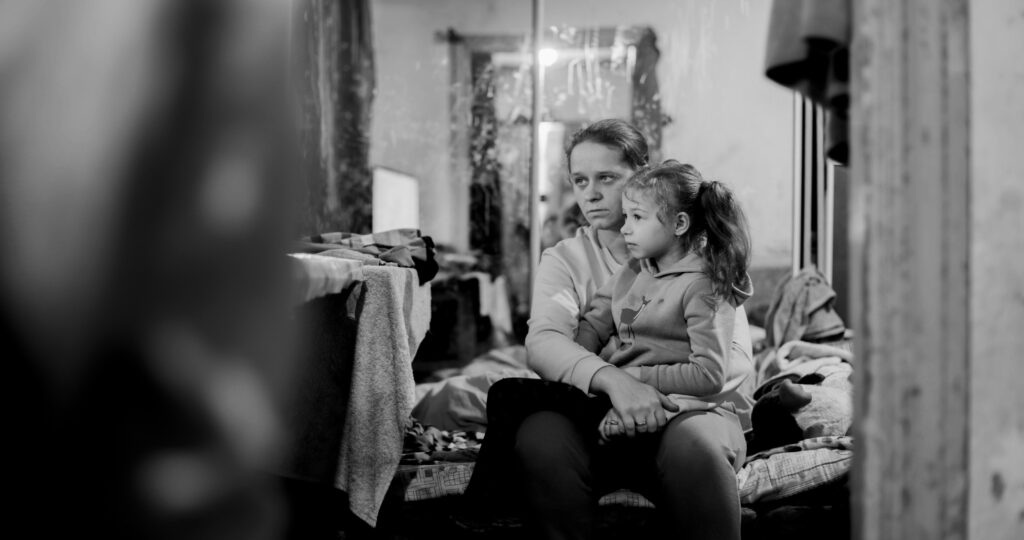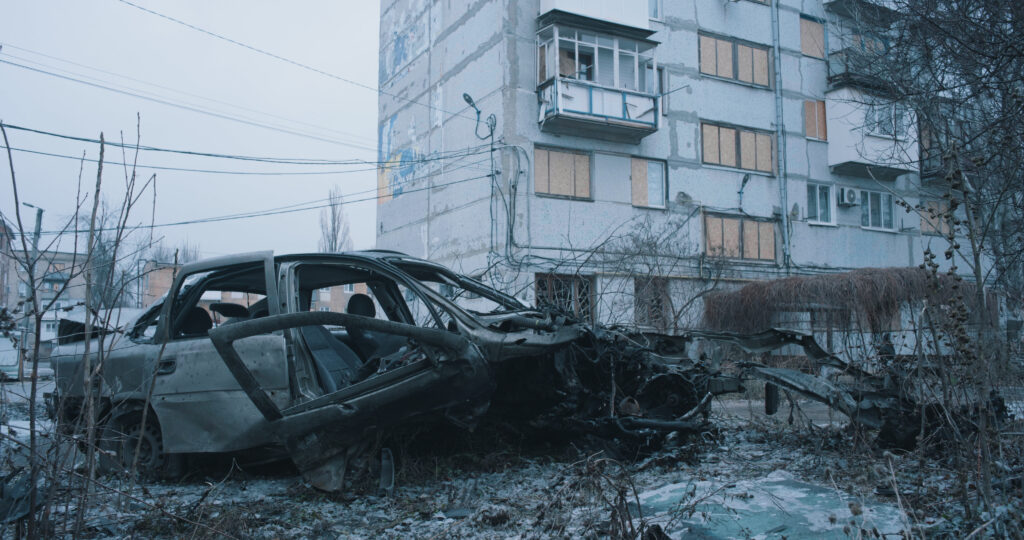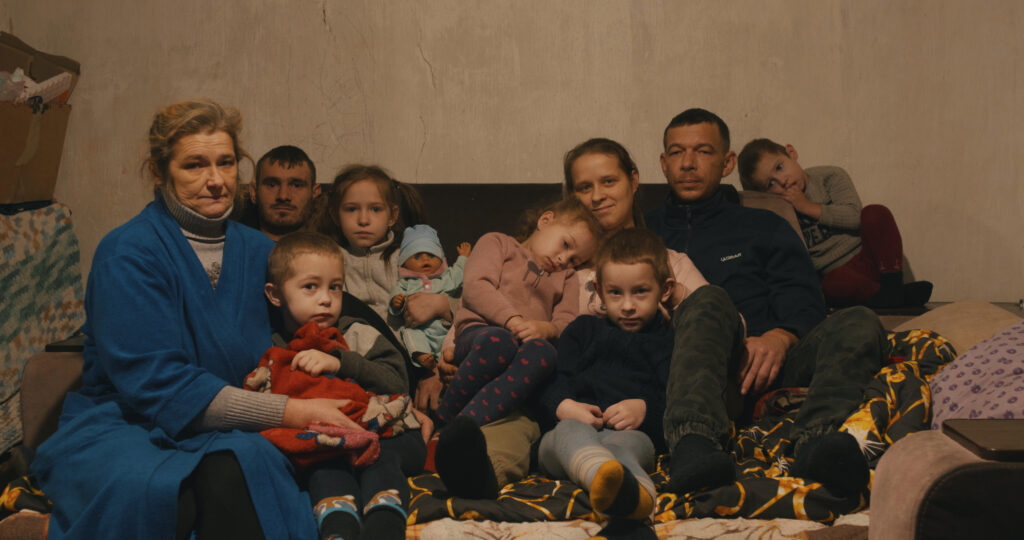
This face in the small coffin looks unnatural. The eyes are closed, long lashes swing over the lids. Thin, blonde curls frame the immaculate forehead. It is unusually warm for a February morning. The sun is shining and there is hardly a cloud in the sky. Everything looks like it has been painted. Unreal. Beautiful and cruel at the same time. The coffin is covered in red velvet, white ruffles surround the small body. Colorful flowers lie on top. The six-year-old girl lies there and we don’t understand why.
We met Polina and the rest of her family around three months ago. Her siblings Yevheniia, Viktor, Volodymyr and Yaroslav, her parents Oleksandr and Sofia, her grandmother Yulia and her uncle Oleksii – they all lived in a small, run-down house in the town of Kurakhove, far to the east of Ukraine. The town is shelled daily by Russian artillery, it is a frontline area. The Sakhatsky family could no longer stay here.
Fate Had Other Plans
The family had already tried twice to flee to safety from the war. Shortly after the invasion, in 2022, the entire family fled to Poland. They stayed there for a while, Oleksandr found a job – the story could have ended there, but fate had other plans.
40-year-old Oleksandr suffered a stroke and was no longer able to work. The Polish bureaucracy and its complexity did the rest. The Sakhatsky family had to return to Ukraine, the money was simply no longer enough.
Back home, they found out that their house had been hit directly by a missile. It was uninhabitable. Fortunately, Oleksandr and Sofia had already bought an old, small house before the invasion, which they intended to renovate and use as a weekend dacha. The whole family moved in – and initially spent their days and nights in the cellar.
At some point, it became too much again, too loud. Too dangerous. So they packed everything up again. This time they went to a refugee shelter in Kyiv. But the family couldn’t stay here either. How could they? Food was not allowed in the rooms, there were fixed bedtimes, they were not permitted to leave the premises after 8 p.m. and they had to share rooms with strangers. Simply impossible for a family with five small children.
Back in Kurakhove, the family lived on the equivalent of around 250 dollars – for five children and four adults.
This is how we met these people: hopeless, disappointed by fate and many other NGOs, let down. Many promises had been made to them – hardly any had been kept. The whole family was disillusioned.

When we arrived, the family met us in a friendly manner, but mother Sofia and her husband could no longer hide their skepticism. Of course they wanted our help. But they had been disappointed so often that they didn’t allow themselves to hope.
We tried to build up trust. We were in constant contact. Members of our Cultural Team also visited the children often, played with them, brought coloring books and other creative materials. We started a fundraiser to raise the money needed for a new house and we gave regular updates to the family so they knew we hadn’t forgotten them.
When the time had come and we had found, bought and renovated a house in central Ukraine, we drove to Kurakhove again with two Sprinters. This time it was to be goodbye to the city forever. We packed up furniture, toys, clothes and all the other things the family needed to live – and completed the move in one day.
Again, we would have been happy if the story had come to an end. But unfortunately it didn’t.
The Worst Thing That Can Happen To A Person
The family settled in. Base UA has an agreement with a cheese factory nearby: They let the people we relocate work for them if they want to – so that the families can live completely independently again as quickly as possible. Everything was prepared, everything was planned – everyone was basically happy at first.
But then something happened that turned the family’s world upside down.
Polina and her siblings were playing. And suddenly the little child swallowed a toy. She couldn’t breathe and turned blue. Father Oleksandr grabbed the child and drove to hospital as quickly as he could. Polina lay in a coma for several days – until the doctors could only pronounce her death.
After the family has gone through the hell of war, been emotionally wounded and abandoned several times – an event occurs that, far removed from war, is one of the worst things that can happen to a person: Losing your own child.
So now we are standing by Polina’s coffin in the quiet, picturesque village in central Ukraine. A pastor gives a moving sermon. Grandmother Julija loses her composure and cries, almost breaking down, but her son Oleksii holds her up. We almost didn’t recognize Oleksandr: He seems transparent, like a ghost. Pale and emaciated. Far away with his thoughts.

Almost the whole village has come to support the family. Here in the cemetery, where there is hardly a sign of the war. One, maybe two flags are waving over the graves, indicating that a Ukrainian soldier is buried here. But otherwise the world here is a peaceful one.
And we can’t help but wonder: what would have happened if all this had happened in Kurakhove? Where there is hardly any infrastructure. No functioning hospital, no church. Where a funeral would not have been possible because of the constant shelling. Where there is simply no space to mourn, because the next danger lurks at the very next breath.
Here, in safety, Polina’s relatives were even able to come to say farewell. There is space to work through this tragedy and we firmly believe that this incredibly strong family will not be broken by it. “They will make it,” says Anton, our board member, who has been with the family from the very beginning. “I’m sure of that.”
